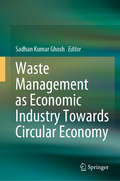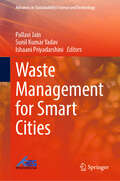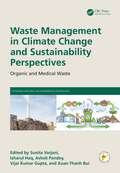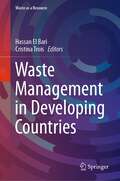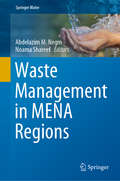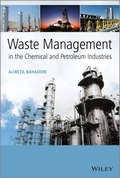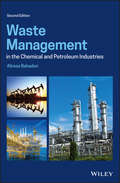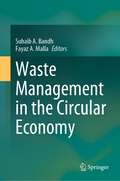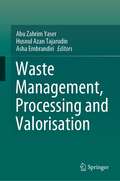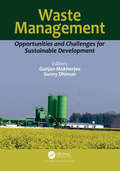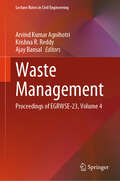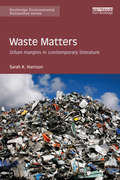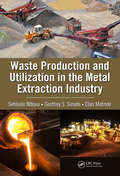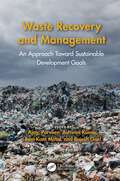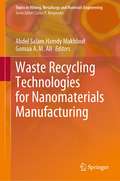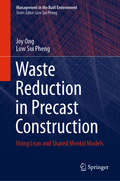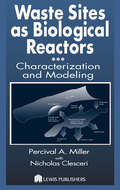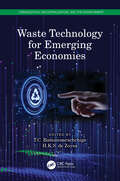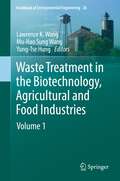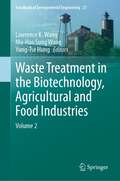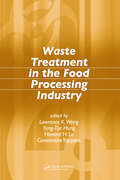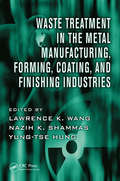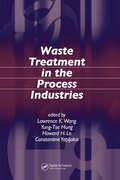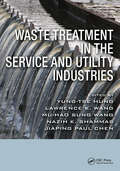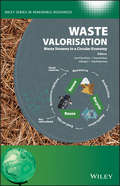- Table View
- List View
Waste Management as Economic Industry Towards Circular Economy
by Sadhan Kumar GhoshThis book highlights the latest advances in waste management, resource recovery and resource circulation in various countries, with a special emphasis on India. It leads the way towards a sustainable circular economy developing local economy and enhances the sustainability of the energy sector as a whole by holistically addressing waste management. Waste management is a major problem around the globe; effective waste disposal is one of the most plaguing issues faced by municipalities. Yet waste can also serve as a major source of energy rather than a disposable material. The book discusses various upstream and downstream aspects of waste management systems, e.g. conversion processes and collection methods, that are needed in order to make waste management systems into an effective industry and move closer to a circular economy. It also provides information on management tools for analysis and decision support. All chapters included here are based on high-quality research papers presented at the conference IconSWM 2018.
Waste Management for Smart Cities (Advances in Sustainability Science and Technology)
by Ishaani Priyadarshini Pallavi Jain Sunil Kumar YadavThis book discusses the management of waste in smart cities. It is a contemporary text that methodically covers a variety of waste types, including organic waste, municipal waste, hazardous/industrial effluents, plastic waste, and electronic waste. It also discusses the sources, handling, and disposal of each type of waste along with the appropriate management techniques.
Waste Management in Climate Change and Sustainability Perspectives: Organic and Medical Waste (Sustainable Industrial and Environmental Bioprocesses)
by Vijai Kumar Gupta Ashok Pandey Sunita Varjani Xuan-Thanh Bui Izharul HaqThis handbook discusses the relationships and effects of climate change on waste treatment and its sustainable management. The waste management sector is in a unique position to transition from a minor source of global greenhouse gas (GHG) emissions to a major contributor to reducing GHG emissions. This book compiles the potential impacts and benefits of various waste management systems in terms of climate impact. It investigates the global climate impact of municipal solid waste, commercial and industrial waste, agricultural waste, and hazardous waste management systems.Key features: Reviews advanced and innovative processes for sustainable waste management Covers green waste treatment technologies using microbes, green soldier flies, earthworms and bacteriophages Discusses the negative and positive effects of waste treatment and disposal Provides relevant case studies from different regions of the world Examines the role of climate change on emerging pollutants The book is meant for researchers and professionals in environmental sciences, chemical and biochemical engineering.
Waste Management in Developing Countries (Waste as a Resource)
by Hassan El Bari Cristina TroisThis book presents state-of-the-art solid waste management in developing countries. It outlines the impact of poor solid waste management on human health and the environment and examines appropriate solid waste management technologies for the developing world. Contributions define waste recovery in a circular economy context and the informal sector's role, describe how sustainable and integrated solid waste management in developing countries contributes to reducing greenhouse gases and their effect on climate change, and analyze the financial and legislation aspects of solid waste management.Waste Management in Developing Countries will be an essential reference for researchers, scientists, and students in waste management and environmental sciences, as well as waste management practitioners, policymakers, municipal officials, and related industry professionals.
Waste Management in MENA Regions (Springer Water)
by Abdelazim M. Negm Noama ShareefThe book presents the state-of-the-art document describing the knowledge, data, cost-effectiveness and technologies employed to manage the waste in several countries such as Morocco, Tunisia, Egypt, Jordon, Syria, Palestine, Lebanon, and Yemen. It covers diverse topics including the status of the waste in the region, solid waste management, solid waste recovery and disposal, the use of the agricultural waste in feeding poultry, sludge disposal and management, wastewater treatment and energy production. Also, the book explains how waste management systems are becoming more complex in many countries with the move from landfill-based to resource recovery-based solutions following the setting of international and national targets to divert waste from landfill and to increase recycling and recovery rates. Besides, this book also evaluates the environmental legislation in the selected countries and suggests new performance enhancements. This book is of interest to environmental professionals including scientists and policymakers in the Middle East, North Africa, and areas with similar features.
Waste Management in the Chemical and Petroleum Industries
by Alireza BahadoriThe global chemical and petroleum industries have always had the challenge of disposing of chemical wastes, by-products, and residuals, but with traditional techniques such as deep well injection and incineration proving flawed, the need for disposal by legal, safe and economically effective means has never been greater. Increasingly, the need to produce without pollution is the preferred model for industry, and the strategy of waste minimization is seen as the best way forward. This is particularly relevant in the petrochemical and chemical industries, where large quantities of hazardous and toxic wastes are produced which can pose formidable disposal problems.Covering the essentials of treatment, recovery and disposal of waste, as well as the requirements for process design and engineering of equipment and facilities in the chemical and petroleum industries, this book includes chapters on: Wastewater TreatmentPhysical Unit OperationsChemical TreatmentBiological TreatmentWastewater Treatment in Unconventional Oil and Gas IndustriesWastewater Sewer SystemsSewage TreatmentSolid Waste Treatment and DisposalPrimarily aimed at researchers and advanced students in chemical, petroleum, and environmental fields as well as those in civil engineering, this book should also provide a unique reference for industry practitioners and anyone interested in chemical and petroleum waste treatment and disposal.
Waste Management in the Chemical and Petroleum Industries
by Alireza BahadoriUnravels fundamental engineering for the treatment, recovery, and disposal of solid waste, sludge and wastewater in the petroleum, chemical, and unconventional oil and gas processing industries This new edition unravels essential requirements for the process design and engineering of the equipment and facilities pertaining to waste management for gas refineries, chemical plants, oil terminals, and petrochemical plants. Updated throughout, Waste Management in the Chemical and Petroleum Industries, Second Edition offers chapters on wastewater treatment; physical unit operations; chemical treatment; biological treatment; and wastewater treatment in unconventional oil and gas industries. It also covers wastewater sewer systems; sewage treatment; and solid waste treatment and disposal. New topics include: water pollution terminals the design procedure for effluent water pollution control spill prevention and control groundwater pollution control wastewater pollution control in crude oil terminals Information on the source of polymeric plants examination of water and wastewater radioactivity soil pollution pipeline leak consequence evaluation Waste Management in the Chemical and Petroleum Industries, Second Edition is an ideal text for researchers and advanced students in chemical, petroleum, and environmental fields, as well as for those in civil engineering.
Waste Management in the Circular Economy
by Suhaib A. Bandh Fayaz A. MallaThis book offers a comprehensive and insightful exploration of the technologies and processes involved in energy generation through waste treatment. It serves as a valuable resource, providing all the necessary information and tools for selecting the most sustainable waste-to-energy solution in various conditions. Moreover, it delves into real-life examples of the circular economy in action, offering a comprehensive overview from multiple perspectives. It employs a range of methodologies, including lifecycle assessment, sustainability assessment, multi-criteria decision-making, and multi-objective optimization modes. By combining these approaches, it offers a robust framework for evaluating waste-to-energy options. Furthermore, the book provides a thorough overview of waste-to-energy feedstocks, technologies, and implementation. It goes beyond mere description, delving into the critical factors and key enablers that influence the sustainable development of the waste-to-energy industry. By addressing these factors, the book facilitates the transformation towards a circular economy, moving beyond the traditional "call to arms" approach. This book is an invaluable resource for researchers and policymakers in the energy sector. It equips them with the scientific methodology and metrics necessary to develop strategies for a viable sustainability transition. Additionally, it serves as a key reference for students, researchers, and practitioners seeking to deepen their knowledge of energy planning and the current and future trends of biofuel as an alternative fuel.
Waste Management, Processing and Valorisation
by Husnul Azan Tajarudin Abu Zahrim Yaser Asha EmbrandiriThis book highlights current efforts and research on waste management, processing and valorization, particularly in Asia-Africa countries. Chapters 1–2 highlight the overview of plastic waste management and the production of waste plastic oil (WPO). Chapters 3–5 discuss the landfill characterization and application of incineration and composting for waste processing. A new achievement in adsorbent production is highlighted in Chapters 6 and 7 while Chapters 10 and 11 focus on sewage characteristic and its utilization using microalgae. Enzyme production using waste is covered by Chapters 10-12. Chapter 13-14 dedicated to the advances in production of bioenergy. The book concludes with a discussion on life cycle analysis for solid waste management (Chapter 15).
Waste Management: Opportunities and Challenges for Sustainable Development
by Gunjan Mukherjee Sunny DhimanSolid and liquid wastes generated as a result of various agricultural, municipal, industrial and several other processes have become a global concern. This book provides detailed information on eco-friendly approaches and low-cost strategies for solid and liquid waste management. It emphasizes how these wastes can be utilized as alternatives to expensive raw materials thus encouraging sustainable development. This book will be useful to all those who have a keen interest in waste management processes.
Waste Management: Proceedings of EGRWSE-23, Volume 4 (Lecture Notes in Civil Engineering #419)
by Krishna R. Reddy Arvind Kumar Agnihotri Ajay BansalThis book contains peer-reviewed and selected papers presented during the International Conference on Environmental Geotechnology, Recycled Waste Materials and Sustainable Engineering (EGRWSE) 2023, held at NIT Jalandhar. It discusses the recent innovations, trends, concerns, practical challenges encountered, and the solutions adopted in waste management and engineering, geotechnical and geoenvironmental engineering, infrastructure engineering and sustainable engineering. This book can serve as a useful resource for researchers, educators, policymakers, and professionals working in the field of civil engineering, chemical engineering, environmental sciences, and public policy.
Waste Matters: Urban margins in contemporary literature (Routledge Environmental Humanities)
by Sarah K. HarrisonHow do those pushed to the margins survive in contemporary cities? What role do they play in today’s increasingly complex urban ecosystems? Faced with stark disparities in human and environmental wellbeing, what form might more equitable cities take? Waste Matters argues that contemporary literature and film offer an insightful and timely response to these questions through their formal and thematic revaluation of urban waste. In their creation of a new urban imaginary which centres on discarded things, degraded places and devalued people, authors and artists such as Patrick Chamoiseau, Chris Abani, Dinaw Mengestu, Suketu Mehta and Vik Muniz suggest opportunities for an inclusive urban politics that demands systematic analysis. Waste Matters assesses the utopian promise and pragmatic limitations of their as yet under-examined work in light of today’s pressing urban challenges. This book will be of great interest to scholars and students of English Literature, Postcolonial Studies, Urban Studies, Environmental Humanities and Film Studies.
Waste Production and Utilization in the Metal Extraction Industry
by Sehliselo Ndlovu Geoffrey S. Simate Elias MatindeIncreasingly stringent environmental regulations and industry adoption of waste minimization guidelines have thus, stimulated the need for the development of recycling and reuse options for metal related waste. This book, therefore, gives an overview of the waste generation, recycle and reuse along the mining, beneficiation, extraction, manufacturing and post-consumer value chain. This book reviews current status and future trends in the recycling and reuse of mineral and metal waste and also details the policy and legislation regarding the waste management, health and environmental impacts in the mining, beneficiation, metal extraction and manufacturing processes. This book is a useful reference for engineers and researchers in industry, policymakers and legislators in governance, and academics on the current status and future trends in the recycling and reuse of mineral and metal waste. Some of the key features of the book are as follows: Holistic approach to waste generation, recycling and reuse along the minerals and metals extraction. Detailed overview of metallurgical waste generation. Practical examples with complete flow sheets, techniques and interventions on waste management. Integrates the technical issues related to efficient resources utilization with the policy and regulatory framework. Novel approach to addressing future commodity shortages.
Waste Recovery and Management: An Approach Toward Sustainable Development Goals
by Ajay Ravi Kant Mittal Ashwini Kumar Parveen Rajesh GoelSustainable development approaches cannot be met unless waste management is addressed as a priority. Waste Recovery and Management: An Approach Toward Sustainable Development Goals presents a comprehensive examination of environmental pollution and health hazards caused by differing types of waste, its recycling and other e-waste management strategies, and potential political and legal interventions. It also presents the available carbon-recycling methods and investigates how these might be applied to reinforce waste management in industrialized countries as well as developing and emerging economies. Each chapter includes valuable data and case studies that serve as practical guidance for academicians, researchers, and stakeholders for quantifying the impacts of waste, and for planning integrated solid waste collection and treatment systems, thereby working toward sustainability at a global level.Features: Covers both traditional and new technologies for identifying and categorizing the sources and nature of various types of waste Provides methods for the safe disposal of municipal solid wastes, plastic waste, bio-medical wastes, hazardous wastes, and e-wastes Explains practical measures to cover the broad spectrum of everyday applications of waste management for environmental sustainability Contains a focused discussion of the current scenario and future research directions for different types of waste in each chapter
Waste Recycling Technologies for Nanomaterials Manufacturing (Topics in Mining, Metallurgy and Materials Engineering)
by Abdel Salam Hamdy Makhlouf Gomaa A. M. AliThis book discusses the recent advances in the wastes recycling technologies to provide low-cost and alternative ways for nanomaterials production. It shows how carbon nanomaterials can be synthesized from different waste sources such as banana fibers, argan (Argania spinosa) seed shells, corn grains, camellia oleifera shell, sugar cane bagasse, oil palm (empty fruit bunches and leaves) and palm kernel shells. Several nanostructured metal oxides (MnO2, Co3O4,….) can be synthesized via recycling of spent batteries. The recovered nanomaterials can be applied in many applications including: Energy (supercapacitors, solar cells, etc.) water treatments (heavy metal ions and dyes removal) and other applications. Spent battery and agriculture waste are rich precursors for metals and carbon, respectively. The book also explores the various recycling techniques, agriculture waste recycling, batteries recycling, and different applications of the recycled materials.
Waste Reduction in Precast Construction: Using Lean and Shared Mental Models (Management in the Built Environment)
by Joy Ong Low Sui PhengThis book presents the adaptation of lean principles to the precast construction industry to eliminate or minimize construction wastes, by modeling the precast construction process influencing manpower requirements. This is done using the shared mental models theory to understand how the lean principles enable people to work together to complete the tasks and work together effectively as a team throughout the entire precast construction process from the design, production and logistics to installation stages. Besides the theoretical concepts, this proposed book also presents the practical aspects faced by contractors through the conduct of questionnaire surveys to understand how the implementation of lean principles and shared mental models will affect the occurrence of construction wastes and hence the changes in the total man days used during the precast construction process. This book also presents a neural network model for developing leading indicators that classify precast construction projects in accordance with the manpower changes achieved through the construct of lean principles and shared mental models. This is to help the construction industry to predict the risk of low construction productivity and enable effective lean implementation to optimize the manpower effort required.
Waste Sites as Biological Reactors: Characterization and Modeling
by Percival A. Miller Nicholas L. ClesceriWhere and how wastes disappear, and how the environment is affected by the process, are issues that affect cities and towns around the world. Recent investigations have convincingly shown that waste poses water, air, and public health dangers that necessitate highly efficient engineered controls. An inexpensive, effective, method for assessing impa
Waste Technology for Emerging Economies (Urbanization, Industrialization, and the Environment)
by T. C BamunuarachchigeThis unique volume covers many aspects of waste management in developing countries. There is a focus on various sources of waste including the pressing issues of agricultural, medicinal, industrial, and urban waste, and emerging problems with e-waste, nanowaste, and microplastics in marine environments. This volume addresses the critical environmental issues resulting from rapid urbanization and industrialization, particularly in the developing world. High-end technologies that can utilize waste as a resource to generate products, processes, and revenue are also discussed. Features Presents technical perspectives on emerging wastes in developing economies Discusses the issues of e-waste, which is growing three times faster than general municipal waste globally Covers the spectrum of nanowaste to upcycling in the market Discusses management of marine plastic debris and microplastics Diverse audience including those in solid waste management, electrical and electronic technology, and the medical industry
Waste Treatment in the Biotechnology, Agricultural and Food Industries: Volume 1 (Handbook of Environmental Engineering #26)
by Lawrence K. Wang Yung-Tse Hung Mu-Hao Sung WangThis book and its 2 sister books (Volumes 2 and 3) of the Handbook of Environmental Engineering (HEE) series have been designed to serve as a mini-series covering agricultural and green biotechnologies. It is expected to be of value to advanced undergraduate and graduate students, to designers of sustainable biological resources systems, and to scientists and researchers. The aim of these books is to provide information on treatment and management of agricultural, pharmaceutical and food wastes and to serve as a basis for advanced study or specialized investigation of the theory and analysis of various integrated environmental control and waste recycle systems. Volume 1 covers topics on: treatment and management of livestock wastes; waste treatment in the pharmaceutical biotechnology industry using green environmental technologies; vermicomposting process for treating agricultural and food wastes; the impacts of climate change on agricultural, food, and public utility industries; innovative PACT activated sludge, CAPTOR activated sludge, activated bio-filter, vertical loop reactor, and PHOSTRIP processes; agricultural waste treatment by water hyacinth aquaculture, wetland aquaculture, evapotranspiration, rapid rate land treatment , slow rate land treatment, and subsurface infiltration; production and applications of crude polyhydroxyalkanoate-containing bioplastic from agricultural and food-processing wastes; optimization processes of biodiesel production from pig and neem seeds blend oil using alternative catalysts from waste biomass; making castor oil a promising source for the production of flavor and fragrance through lipase mediated biotransformation; and waste treatment and minimization in baker's yeast industry.
Waste Treatment in the Biotechnology, Agricultural and Food Industries: Volume 2 (Handbook of Environmental Engineering #27)
by Lawrence K. Wang Yung-Tse Hung Mu-Hao Sung WangThis book and its sister book (Volume 1 ) of the Handbook of Environmental Engineering (HEE) series have been designed to serve as a mini-series covering waste treatment in biotechnology, agricultural and food industries . It is expected to be of value to advanced undergraduate and graduate students, to designers of sustainable biological resources systems, and to scientists and researchers. The aim of these books is to provide information on bio-environmental engineering, and to serve as a basis for advanced study or specialized investigation of the theory and analysis of various agricultural and natural resources systems. Volume 2 covers topics on: (a) application of secondary flotation-filtration and coagulant recycle for improvement of a pulp mill primary waste treatment facility; (b) management of solid and hazardous wastes; (c) microbial enzymes for wastewater treatment; (d) a multi-criteria approach to appropriate treatment technology selection for water reclamation; (e) chemicals used in agriculture: hazards and associated toxicity issues; (f) biochar for adsorptive removal of pharmaceuticals from environmental water; (g) treatment of palm oil mill effluent; (h) treatment and management of solid waste by incineration; (i) technologies for removal of volatile organic compounds (VOC) from industrial effluents and/or potable water sources; (j) treatment of healthcare waste.
Waste Treatment in the Food Processing Industry (Advances in Industrial and Hazardous Wastes Treatment)
by Lawrence K. Wang Yung-Tse Hung Howard H. LoMany standard industrial waste treatment texts sufficiently address a few major technologies for conventional in-plant environmental control strategies in the food industry. But none explore the complete range of technologies with a focus on new developments in innovative and alternative technology, design criteria, effluent standards, managerial d
Waste Treatment in the Metal Manufacturing, Forming, Coating, and Finishing Industries (Advances in Industrial and Hazardous Wastes Treatment)
by Lawrence K. Wang Yung-Tse Hung Nazih K. ShammasComprehensive in its scope and directly applicable to daily waste management problems of specific industries, Waste Treatment in the Metal Manufacturing, Forming, Coating, and Finishing Industries covers hazardous industrial waste treatment, renovation, and reuse in the metal manufacturing, forming, coating, enameling, and finishing industries. It
Waste Treatment in the Process Industries (Advances in Industrial and Hazardous Wastes Treatment)
by Lawrence K. Wang Yung-Tse Hung Howard H. Lo Constantine YapijakisIncreasing demand on industrial capacity has, as an unintended consequence, produced an accompanying increase in harmful and hazardous wastes. Derived from the second edition of the popular Handbook of Industrial and Hazardous Wastes Treatment, Waste Treatment in the Process Industries outlines the fundamentals and latest developments in waste trea
Waste Treatment in the Service and Utility Industries (Advances in Industrial and Hazardous Wastes Treatment)
by Lawrence K. Wang Yung-Tse Hung Nazih K. Shammas Jiaping Paul Chen Mu-Hao S. WangThis volume provides in-depth coverage of environmental pollution sources, waste characteristics, control technologies, management strategies, facility innovations, process alternatives, costs, case histories, effluent standards, and future trends in the process industries. It delineates methodologies, technologies, and the regional and global effects of important pollution control practices. The authors focus on new developments in innovative and alternative technologies, design criteria, effluent standards, managerial decision methodology, and regional and global environmental conservation specific to process industries.
Waste Valorisation: Waste Streams in a Circular Economy (Wiley Series in Renewable Resource)
by Christian V. StevensA guide to the wide-variety of waste valorisation techniques related to various biomass, waste materials and by products Waste Valorisation provides a comprehensive review of waste chemistry and its application to the generation of value-added products. The authors – noted experts on the topic – offer a clear understanding of waste diversity, drivers and policies governing its valorisation based on the location. The book provides information on the principles behind various valorisation schemes and offers a description of general treatment options with their evaluation guidelines in terms of cost, energy consumption and waste generation. Each of the book's chapters contain an introduction which summarises the current production and processing methods, yields, energy sources and other pertinent information for each specific type of waste. The authors focus on the most relevant novel technologies for value-added processing of waste streams or industrial by-products which can readily be integrated into current waste management systems. They also provide the pertinent technical, economic, social and environmental evaluations of bioconversions as future sustainable technologies in a biorefinery. This important book: Presents the most current technologies which integrate waste and/or by-product valorisation Includes discussions on end-product purity and life-cycle assessment challenges Explores relevant novel technologies for value-added processing of waste streams or industrial by-products which can be integrated into current waste management systems Offers a guide to waste reuse, a key sustainability goal for existing biorefineries wishing to reduce material and environmental costs Written for academic researchers and industrial scientists working in agricultural and food production, bioconversions and waste management professionals, Waste Valorisation is an authoritative guide to the chemistry and applications of waste materials and provides an overview of the most recent developments in the field.
